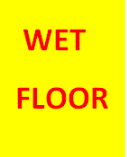I hope you find my writing and business tips and observations useful. My business and blog are dedicated to helping businesses communicate clearly and reach their potential.
Read, subscribe to my newsletter, enjoy!Tash
Poor communications a laughing matter?
Last night, I went to the launch of the Whitehorse Business Week at Headland and was entertained by guest speaker Russell Gilbert.
Although I have seen Russell many times on TV shows and the like, I hadn’t seen a full routine from him before. I really enjoyed it – he was funny and had us all laughing, but also showed he can do magic and sing.
Two of his jokes in particular were based on communications so I thought I’d share them today.
Multiple meanings
 Have you seen one of those yellow signs warning of ‘wet floor’?
Have you seen one of those yellow signs warning of ‘wet floor’?
Russell apparently cannot see one of those signs without looking for a bucket of water (ok, I’m using a more appropriate source of liquid!) so he can wet the floor.
In this case, the signs are not incorrect but Russell spotted that ‘wet’ can be an adjective (as intended on these signs) or a verb (as the instruction Russell assumed).
For any important message, it is worth checking for alternative versions of a word to be sure you aren’t saying something you really don’t want to say!
Clarity through order
 Russell also spoke about cleaning products, which may not seem very funny!
Russell also spoke about cleaning products, which may not seem very funny!
Many cleaning products include the sentence ‘cleans and kills germs’ but Russell asked why would you bother cleaning the germs before killing them?
Do the germs say ‘I’m dying but I’ve never looked so clean, it’s great!’?
Ok, we all know they mean ‘cleans a surface and kills germs on that surface’. And it’s good they’ve gone for a shorter version to give their message clarity.
They could make their message much clearer simply by changing the order of that sentence – ‘kills germs and cleans’ is much clearer and doesn’t give comedians an opportunity to pick on it :).
However, kill germs and cleans sounds wrong because we are so used to the other order – would you think that’s a negative or a positive for changing the order if you were producing a new cleaning label?
Do marketers want the emphasis on cleaning or killing germs? Would that be a factor in which order those words are placed?
Would your label aim for clarity or marketing emphasis or customer familiarity?
* images courtesy of 123rf and Tash Hughes
Root, Rout, Route – which to take?
 This group of words will be more or less confusing depending on where you live; in Australia, root and route sound quite different so we get confused more by American TV and movies than in common speech.
This group of words will be more or less confusing depending on where you live; in Australia, root and route sound quite different so we get confused more by American TV and movies than in common speech.
Root [noun]: part of a plant that anchors it and sources nutrients for the plant; an anchoring structure or element such as the part of a hair under the skin and the underlying cause of an issue
Carrots and parsnips are both root vegetables.
It is the love of money, rather than money, that is the root of many problems.
Rout [noun]: an obvious defeat or unruly withdrawal of troops form a battle; a disorganised crowd, often rioting
The General was not sympathetic to his officers after the rout last week.
Route [noun]: a path or means of travel; a designated area or path for a salesperson or franchise; the means of entry (generally used in medical situations)
The cubs carefully planned their route with a compass and map.
Sneezing is a common route of transmission for the flu virus.
To tell root and rout apart, remember that a rout is about the soldiers getting out of a loosing battle.
Of course, I should also mention that there is another (not so family friendly) meaning of the word ‘root’ in Australia – while it may be slang, it is well known and has caused many a laugh when international visitors use the word unwisely!
Elocution is an art, locution a style
If you have ever tried acting or serious public speaking, you may well have thought about your elocution – but how about your locution?
locution: [noun] style of spoken language, a phrase or idiom
A linguist can easily tell people apart by their locution.
elocution: [noun] how speech is delivered, the art of delivery speech
The actress changed characters predominantly by changing her elocution.
To tell them apart remember that elocution is how you orally express your thoughts.
Be wary, you’ll get weary
Wary: to be cautious and aware, on guard
I am wary of links in emails from people I don’t know.
Weary: exhausted or very tired. It can be physically tired or an exhaustion of energy, tolerance and spirit.
The weary CFA volunteers were grateful for a cold drink.
Thinking “if you were in a war, you would need to be wary of your environment” may help you tell these two definitions apart.
The meaning of spade, or is it spayed?
Spade: a tool used for digging and moving dirt
The gardener prepared the new flower bed with his spade.
Spayed:the process of desexing an animal to prevent unwanted young.
The vet spayed three cats and one dog today.
Definitely not two words you want to confuse the meanings of!
Your seam seems a little loose
Seam:a line where two edges join. Often used for the stitching and area beyond the stitching where fabric is joined in clothes.
The pattern allowed for a 5mm seam.
Seem: to appear
It seems he is selling his home.
seemly: to appear in a fitting or proper manner
“It would not be seemly for a woman to wear pants” said Queen Victoria.
Let’s take the role for a roll!
Role: the title and/or behaviours and actions associated with or expected of someone. It also applies to the playing of a character in acting.
In the role of friend, I have to tell you that there is a problem.
Roll:to move along or around in a circular or cyclical way
They used to roll jaffas down the aisle in wooden theatres.
The students’ knowledge grew as the weeks rolled by.
Who is a retch or wretch?
Retch: the act of vomiting, or trying to
Just the smell of the rancid meat made them all retch into the bushes.
Wretch: someone you pity for their miserable state OR someone you despise and consider lowly and/or despicable
He threw some coins to the poor wretch beside the pier.
Then the rotten wretch set the house on fire with me in it!
This definitely is not a pair of words to get wrong – imagine implying someone you pity induces vomiting! The way to remember which is which is to use w for who – who is the wretch? The verb retch is not a person and doesn’t have a w!
Have you recently resent that?
Sometimes, I really wonder how people learn English as a second language – it can be so tricky! For instance, the letters s and c can sound exactly the same but using the wrong one can totally change the meaning of a word, such as in recent and resent.
Recent: of a similar time to the present – not long ago or far into the future.
The recent rains have helped our water supply.
Resent: to send something again.
I resent the email after he said he hadn’t received it the first time.
If English isn’t your first language, do you find learning such words difficult?
You look ravishingly ravenous today
Today’s meanings are not words that sound alike (well, except for starting with rav!) but can be easily confused…
Ravaging: causing destruction, destroying something
The Vikings are known for ravaging many towns and villages.
Ravishing: taking by force; raping. It is more commonly used to mean ‘of great beauty and delight’ which derives from women of great beauty ‘raping’ men of their senses with their beauty!
Ravishing rich women was one of the old pirate’s delights.
Ravenous: very hungry {as hungry as a beast came from the devouring aspect of ravish.}
They were ravenous after their long hike.

Recent Comments